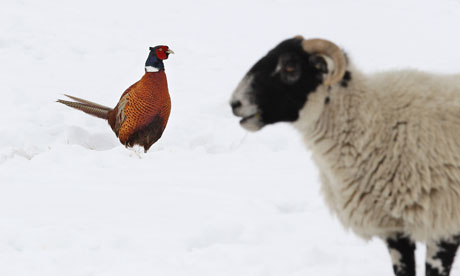
April, once the second month of the Roman year is now our fourth month, and so we find ourselves one third of the way through our projected poetic calendar. If March was the month of Mars, god of warfare, then this is the month of Venus, goddess of love and spring rebirth. Although the etymology of the word April is uncertain, given that it was dedicated to the Roman goddess of love the idea that it derives from Aphrodite is an appealing one. What is undoubtedly the case is that April is the month when spring has well and truly sprung.
In The Shepheardes Calender, Spenser's April consists, for the most part, of a hymn to the glory of Elizabeth, the Virgin Queen, paradoxical Venus of the English Pantheon whose brightness outdoes both sun and moon. This paean is prefaced by a tale of the Colin Clout's unrequited love, a rejection that resulted in the loss of his poetic abilities; love and inspiration are intimately linked.
Inevitably, any mention of April will, sooner or later, involve some reference to showers. Perhaps the most famous poetic conjunction of these two terms in English occurs in the opening lines of the General Prologue to Chaucer's Canterbury Tales. Almost as well-known is TS Eliot's reworking of the General Prologue in the opening passage of The Waste Land. Where Chaucer is conventionally enthusiastic about the arrival of spring, Eliot characteristically takes a more jaundiced view. The earlier poet's April showers are replaced by a spring rain that is held responsible for stirring an unwelcome instinct to revival.
The March Poster poems article was accompanied by a very colourful image of daffodils. As it happens, the most celebrated encounter with the genus Narcissus in English poetry happened on Thursday 15 April 1802. This was recorded in the journal of Dorothy Wordsworth; it appears that her brother may have written a poem celebrating the same encounter, perhaps you've heard of it? I can't but wonder if the earlier arrival of these golden trumpets nowadays isn't a consequence of global warming; it certainly serves to remind us that the Wordsworths and their contemporaries were inhabitants of an island in the grip of a Little Ice Age.
If the chilly world of the Wordsworths' narcissi is unmistakably rural, Arthur Symons celebrates the impact of spring on the urban landscape in his delightful poem April Midnight. In the London night-time, the moon may be replaced by gaslight, but the miraculous April weather is just as much an invitation to love here as anywhere else, and poet and dancer succumb to its warmth willingly and with a child-like sense of wonder.
Like Symons, Langston Hughes was an unabashedly urban poet, and his April Rain Song is an evocation of the cleansing and revivifying effect of a sudden spring downpour on the city streets and their inhabitants and the soothing music it can play on our roofs at night. It's tempting to curse any weather that isn't warm and dry, but I have to admit that there's a part of me that shares the poet's simple closing 'And I love the rain.'
As with the first three months of the year, April has its share of historical events, and of poems that mark their passing. My own favorite is Charles Reznikoff's The English in Virginia, April 1607. It's a deceptively simple-looking poem to mark such a momentous event as the landing of the first English colonists. However, the careful cataloguing of things seen and recognized and the assertive rhythm of its articulation is an assertion of the welcoming inhabitability of their new home, a welcome only partially overshadowed by the presence of the armed "savages" of the closing lines.
And so the time has arrived for your own April poems. You may wish to avoid mention of the ubiquitous showers, or, like Langston Hughes, you may want to rejoice in them. This full-blooded burgeoning April spring may be cause for celebration or Eliotic world-weariness. You might, I suppose, even care to mention daffodils. The main thing is to start posting your April poems here.

